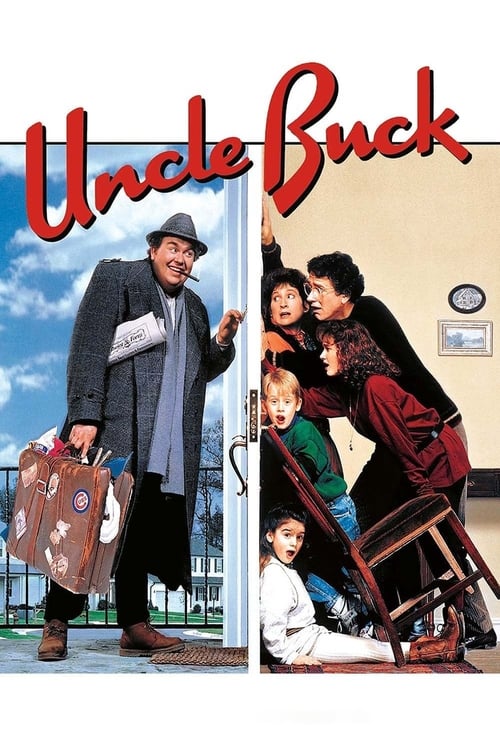Uncle Buck – Film Review
Published August 29, 2023

When Cindy and her husband, Bob, have to leave town for a family emergency, there is only one person available to babysit for their three kids: Bob’s lazy, carefree brother, Buck. While he immediately gets along with the two younger children, Buck must change his bachelor lifestyle if he wants to be a responsible caregiver for the angst-filled teenager, Tia.
Released in 1989, Uncle Buck stands as one of the quintessential family comedies from the mind of John Hughes. Known for his ability to blend humor with heartfelt moments, Hughes once again showcases his prowess in crafting relatable characters and situations that leave a lasting impression on the audience. While Uncle Buck might not be the pinnacle of Hughes’ filmography, it undeniably retains a charm that has helped it endure through the decades.
One of the film’s strong suits is its colorful array of characters, brought to life by a competent cast. John Candy takes center stage as the titular Uncle Buck, an immature and lovable oaf who finds himself in charge of his niece and nephews when a family emergency arises. Candy’s charismatic performance adds depth to Buck’s character, moving beyond mere slapstick humor to explore his journey from an aimless wanderer to a responsible guardian.
Equally noteworthy is Macaulay Culkin in his pre-Home Alone breakout role as Miles, the wisecracking and skeptical older nephew. Culkin’s natural comedic timing is evident even at a young age, setting the stage for his later successes. Gaby Hoffmann as the youngest niece, Maizy, delivers an endearing portrayal that softens the edges of the film’s more chaotic moments.
While Candy’s performance anchors the movie, some of the supporting cast falls into predictable stereotypes. The character of Chanice, played by Amy Madigan, is a refreshingly independent figure, but her potential is somewhat undermined by the script’s treatment of her as a romantic interest for Buck rather than a fully fleshed-out character in her own right.
Uncle Buck follows a classic comedic formula: a bumbling but well-intentioned character is thrust into an unfamiliar situation, leading to a series of comedic mishaps. In this case, Uncle Buck must navigate the responsibilities of childcare, creating a hilarious clash between his carefree lifestyle and the demands of a suburban family.
The film’s humor ranges from laugh-out-loud slapstick to more subtle, character-driven moments. Hughes masterfully employs physical comedy, especially through Candy’s impeccable timing and facial expressions. From a giant pancake breakfast fiasco to Buck’s unforgettable encounter with a clown-sized drill, the film’s humorous set pieces keep the audience engaged.
However, the film occasionally relies on lowbrow humor and caricatures, which might not resonate with all viewers. The interactions between Buck and his disapproving future in-laws sometimes descend into exaggerated farce, threatening to veer into sitcom territory. Fortunately, the heartwarming moments between Buck and the kids, as well as his eventual transformation into a responsible guardian, offset the more outlandish comedic elements.
Beneath the film’s comedic surface lies a heartfelt exploration of family dynamics and personal growth. Uncle Buck touches on the theme of unconventional family structures and how relationships can evolve in unexpected ways. The central message revolves around Buck’s transformation from a self-centered bachelor to a caring guardian, driven by his newfound sense of responsibility. It’s a message that resonates even today, as individuals continue to adapt to changing family dynamics.
The film also addresses the tension between societal expectations and individual choices. Buck’s unorthodox lifestyle clashes with the conservative values of his sister-in-law, leading to confrontations that expose the generational and lifestyle divides. While the film doesn’t delve too deeply into these themes, they add a layer of complexity beyond the surface-level humor.
John Hughes, known for his knack for capturing the essence of suburban life, provides Uncle Buck with a visually consistent backdrop. The film’s depiction of middle-class America in the late 80s is well-executed, from the well-manicured lawns to the familiar suburban houses. Hughes’ signature attention to detail can be seen in the quirky interior of Buck’s cluttered apartment, reflecting his unconventional personality.
However, the film doesn’t particularly stand out in terms of visual style or innovative direction. While Hughes’ direction effectively serves the story, it doesn’t push boundaries or experiment with visual storytelling techniques. The film’s aesthetics align with the overall tone of the 80s, complete with a synth-heavy soundtrack that enhances the comedic moments.
Uncle Buck may not be John Hughes’ magnum opus, but it remains a heartwarming and endearing family comedy. John Candy’s memorable performance as the lovable Uncle Buck and the film’s exploration of family dynamics and personal growth contribute to its lasting appeal. While the humor occasionally dips into caricature territory and some characters are underutilized, the film strikes a balance between slapstick comedy and genuine emotion. Its relatable themes and moments of hilarity make Uncle Buck a worthwhile addition to the collection of 80s comedies that continue to bring joy to audiences of all ages.
